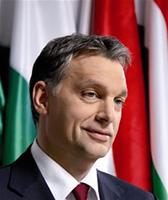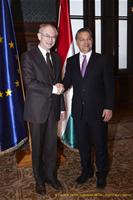The old disease of new member states
Adelina Marini, January 4, 2011
 Slovenia was a deceiving shot. When the small Alpine state (first of the new EU member states) took over the rotation EU presidency, yet even before the entry into force of the Lisbon Treaty, those who were waiting skeptically to see whether Slovenia would fail, were not many. And it indeed did not fail. It led the six months of its presidency professionally, with a focus on the enlargement policy.
Slovenia was a deceiving shot. When the small Alpine state (first of the new EU member states) took over the rotation EU presidency, yet even before the entry into force of the Lisbon Treaty, those who were waiting skeptically to see whether Slovenia would fail, were not many. And it indeed did not fail. It led the six months of its presidency professionally, with a focus on the enlargement policy.
Second of the new member states was the Czech Republic in the first half of 2009. Alas, its performance was not that impressive as Slovenia's and was marked by several tough moments yet in its very beginning - the renewal of Israeli-Palestinian military activities that evoked the foreign minister to drop out an incautious remark. Then was the gas crisis between Russia and Ukraine that left thousands of households in Europe in the dark and cold, and the most hit as usually again was Bulgaria.
Now it is a third country's turn to take over the presidency - Hungary. The situation, however, looks very much different not only because the Lisbon Treaty entered into forces more than a year ago but also because Hungary itself has changed a lot.
Who will lead the Eu in the next 6 months?
For more than 20 years we had to be sure that Hungary was already a fully fledged  European Union's member state, that had turned its back entirely to its communist past and had recovered the values it shared with its European partners. After all, there were a lot of reasons for such expectations - like other countries in Central Europe (the Czech Republic and Poland) Hungary as well did not stay calm during the Cold War and wanted to be independent.
European Union's member state, that had turned its back entirely to its communist past and had recovered the values it shared with its European partners. After all, there were a lot of reasons for such expectations - like other countries in Central Europe (the Czech Republic and Poland) Hungary as well did not stay calm during the Cold War and wanted to be independent.
Regretfully, though, the countries whose transition had been marked by the return to power of communists or their political heirs, are just doomed to wander in the search of the right way. Surprisingly, similar to Bulgaria, the situation in Hungary is demotivating. A prime minister from the severest years of the transition is again on top of the country after a lying socialist government that led the state almost to bankruptcy. This was the reason why Viktor Orban and his centre-right party Fidesz won a ruling majority. But who could have guessed that thus the way for authoritarian ideas was cleared.
It's the freedom of speech, Viktor!
 Except from making several serious steps against the foreign business in Hungary (as if he was a copy-cat of Boyko Borissov), Viktor Orban attacked daringly, yet in the very beginning of his term, media as well. The ruling majority proposed a new legislative package aimed at regulating and supervising media. For the purpose a Media Council is being set up - something very much alike our Council for Electronic Media, which however does not cover only electronic media but all - print and web. Furthermore, the members of the Council, that has already started operation, are coming entirely from the ruling party.
Except from making several serious steps against the foreign business in Hungary (as if he was a copy-cat of Boyko Borissov), Viktor Orban attacked daringly, yet in the very beginning of his term, media as well. The ruling majority proposed a new legislative package aimed at regulating and supervising media. For the purpose a Media Council is being set up - something very much alike our Council for Electronic Media, which however does not cover only electronic media but all - print and web. Furthermore, the members of the Council, that has already started operation, are coming entirely from the ruling party.
The legislative package caused severe reactions in Hungary itself but abroad as well and it amazingly reminds of the attempts which the current Bulgarian government made last summer in order to put media under stricter control. For now, though, these attempts failed - be it because even now the majority of media in Bulgaria are already in favour of the ruling party either voluntarily or not quite. Hungary, however, entered the spotlights not only for the fact that the media legislative package was indeed very restrictive but also because in the next 6 months Budapest would be representing the European Union in a series of international forums.
No one in the developed world cannot even imagine that it is possible the EU to speak to the world through the sifter of censorship, auto-censorship and non-freedom, and all this 22 years after the fall of the Berlin Wall. Maybe this is why the reaction of one of the most influential international newspapers, the Washington Post, was so sharp. In an editorial (please note - an editorial!) the newspaper writes that Europe's approach toward what's happening in Hungary is wrong. "Europe cannot allow a member government to flout fundamental freedoms without consequence". Furthermore, under the title "The Putinization of Hungary" the newspaper points out that there are already tools to exercise leverage against the country.
Hungary is expected to host the European Union summit in Budapest, with Secretary of State Hillary Rodham Clinton expected to attend. Mr Orban should be given a choice between curbing his concentration of power and amending the media laws - or suffering the humiliation of having the European Union and the United States move or boycott his summit.
Was it a transition to describe it
And as obviously the transition in the new members of the European Union will not be over soon (or at least for the largest part of them), this is why they have to continue to be subject of serious studies and analyses. Such an analysis has been prepared by the think-tank European Stability Initiative, based in Wien. The think-tank is focused mainly on security issues, especially in the area of South-Eastern Europe.
The analysis is entitled "A Manual on Hungary" and is indeed written just like a manual, very indicatively. For example, the beginning of the manual is dedicated to media because it is important a person to know what waves come from Budapest and who is airing them. It is probably not surprising that, according to the Manual, in Hungary tabloid media prevail. This type of media rely on fast news, not very pretentious about reliability but quickly attracting the attention.
In the Manual the authors point explicitly the sources of funding of media in Hungary, as well as what political lines they defend. The Manual also provides contacts. It appears (again just like in Bulgaria) that foreign news are not frequent in Hungarian media and not many of them have correspondents in Brussels in order to pay more attention to European issues. Instead, there are specialised print-editions for farmers, for the Danube river potential, as well as for foreign policy.
Further on the Manual examines the main non-governmental organisations, think-tanks and academia. Politics is at the very end of the Manual and explains in general the type of statehood of Hungary, what the election system is and who are the main political figures as well as their past.
Hungary has also not said farewell to its recent past
You will probably be surprised that in Hungary too the collaborators to the former secret service is an issue too. Although we cannot see from the manual whether the scales of the problem are similar to Bulgaria, especially after the Files Committee recently disclosed the names of current and former Bulgarian diplomats  abroad, after all it seems that the current Hungarian foreign minister, Janos Martonyi had similar problems.
abroad, after all it seems that the current Hungarian foreign minister, Janos Martonyi had similar problems.
I guess that for every unbiased reader his biography would seem more than decent, but for a person born and raised in a communist state, reading his biography causes raising of eyebrows and mistrust. This happened to me too, while I was reading the short description of Janos Martonyi's life in European Stability Initiative's Manual. Mr Martonyi is a lawyer by profession but the first red light appears yet with the information that he studied international trade in the City of London College in 1968 as well as international public and private law in the Hague in 1970.
For the younger readers we should say that it was not typical in those times people to be able freely to travel around the world and study abroad. Usually close to the then-power were able to do that or refugees. Obviously Janos Martonyi was not among the latter because he started his political career in 1979 as a Trade Secretary in the Hungarian Trade Council in Brussels. Then Martonyi worked in the Ministry for Foreign Trade, taking mid-managerial positions and later he joined the Ministry of Foreign Affairs which he left during the socialist government of Gyula Horn.
Janos Martonyi was a foreign minister in the first government of Viktor Orban too (1998-2002), precisely in the peak of accession negotiations with the EU. Although he is famous as being a supporter of Hungary's European perspective and its euro-atlantic orientation, a publication in a newspaper accuses Martonyi of being an informer to the secret service between 1970 and mid-80's. An accusation which Janos Martonyi denies. Furthermore, the diplomat sued the journalist that wrote the article and won the case, which stated that there were no evidence to prove the journalist's claims.
 All this is indeed just a manual but it should clearly show several very important things which we in Bulgaria have come to understand quite painfully. For example that transition is not something that lasts 20 years and ends always successfully, but rather it is something that either happens or not. Besides, transition needs more the stick than the carrot. The EU starts to slowly and painfully realise this but only in terms of the euro area. Let's hope that the reason why it will realise this in terms of enlargement would not be that painful. Because, if until recently the only "problems" were that the EU accepted Bulgaria and Romania unprepared, one day the Union will have to answer the question "What unprepared actually means". And what is happening in Hungary leads to exactly this question.
All this is indeed just a manual but it should clearly show several very important things which we in Bulgaria have come to understand quite painfully. For example that transition is not something that lasts 20 years and ends always successfully, but rather it is something that either happens or not. Besides, transition needs more the stick than the carrot. The EU starts to slowly and painfully realise this but only in terms of the euro area. Let's hope that the reason why it will realise this in terms of enlargement would not be that painful. Because, if until recently the only "problems" were that the EU accepted Bulgaria and Romania unprepared, one day the Union will have to answer the question "What unprepared actually means". And what is happening in Hungary leads to exactly this question.
It is clear yet from now that the EU will continue to be silent with some sporadic here and there statements of some member states. This would additionally strengthen the painful impression that maybe enlargement happened too early, fed by now by Bulgaria and Romania only, who joined the Union 3 years after Hungary. But if this time the EU does not pay sufficient attention to the problem, it will make its own efforts after the fall of the Berlin Wall senseless - a lot of noise for nothing. And, in fact, here not just the EU has to state its position but the next presidency as well - Poland, which will take over Union's helm from July 1st. Another new member state.